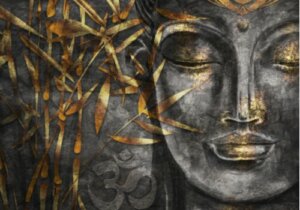The Most Harmful Emotions, According to Buddhism

The most harmful emotions, according to Buddhism, are fear, anger, guilt, and dissatisfaction. These are all powerful emotions, which tend to be invasive and disrupt our inner balance. However, you can fight them by identifying them, accepting them, and letting them go.
For Buddhism, there are only two essential emotions: love and fear. All other subjective experiences derive from these two major axes. However, the most harmful emotions are those that stem from fear.
When Buddhism speaks about the most harmful emotions, it refers to those that radically break the internal balance. In addition, they’re the ones that also become invasive and more or less lasting. They tend to easily become habits. They shape your way of being and have important consequences for your health and social relationships.
For Buddhists, the human being is fundamentally serene and good. However, the world we live in gives rise to strong tensions that, if not managed, lead to the most harmful internal states governed by fear, anger, guilt, and dissatisfaction. Let’s look at each in more detail.

Fear is the source of all evil, according to Buddhism
Buddhists point out that fear tops the list of the most harmful emotions and is very attached to the ego. The bigger the ego, the more vulnerable you are to fear. When the ego takes over, it’s easy to end up seeing reality only in terms of your wants and needs.
Fear usually points to the fear of not getting something or of losing something that’s thought of as your own. In both cases, the point of reference is the self and its possessions. This feeling tends to be diluted when you understand that the universe has its own logic and that you aren’t the center of it. In fact, not everything depends on your will and you never have complete control over the environment and its evolution.
Anger, one of the most harmful emotions
Fear often leads to anger. When you fear something, the natural reaction is to put yourself in a position of attack or defense against what you see as a risk or danger. When it feels threatened, every animal activates the mechanisms of aggression. In response to this, Buddhism says that human beings aren’t really prepared to be aggressive and that’s why they don’t have claws or fangs.
Anger is usually an expression of frustration, because what you desire doesn’t coincide with what reality gives you. Here again, the ego comes into play. Without realizing it, you try to make reality bend to your desires and needs, forgetting that you aren’t alone in the universe but that you’re a small particle of it.
Guilt is a bad companion, according to Buddhism
Guilt or remorse don’t bring anything good to your life. They’re expressions of reproach for having acted against your principles or convictions. It isn’t exactly consciousness of having done harm but punishment for not having lived up to what we think about ourselves.
The advisable thing is not to martyr yourself for what you did but to find the meaning of those acts or those words that you regret. You need to find the causes that led you to act in that way and the consequences that this generates, for yourself and for others. Then, to accept that you’re in a process of evolution and that any event has the potential to teach you something.

Dissatisfaction is useless
Dissatisfaction is another name for suffering. You suffer because you don’t accept your reality. Everyone would like to achieve something that they haven’t yet been able to. Desires and attachments are behind all forms of unhappiness, which are reflections of dissatisfaction and suffering.
Learning that nothing is permanent and being aware that the universe works as it should will make you stronger in the face of frustration. Everything comes and everything goes at the right time. Nothing lasts forever, so change is the norm. Therefore, opposition to change is rarely successful if you understand permanence as success.
For Buddhism, you can manage the most harmful emotions with three steps. The first is to recognize them, because only then can you deal with them. The second is to accept them, without punishing yourself for them and admitting that you’re feeling them. The third is to let them go. Controlling your breathing could also prove helpful.
All cited sources were thoroughly reviewed by our team to ensure their quality, reliability, currency, and validity. The bibliography of this article was considered reliable and of academic or scientific accuracy.
- Calle, R. A. (1998). Guía práctica de la salud emocional: cómo curar sus emociones negativas para acceder a una vida más plena y feliz (Vol. 507). Edaf.
This text is provided for informational purposes only and does not replace consultation with a professional. If in doubt, consult your specialist.








